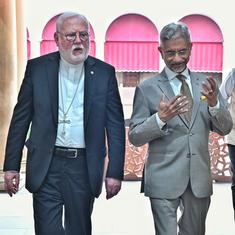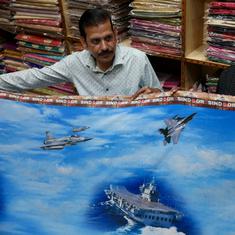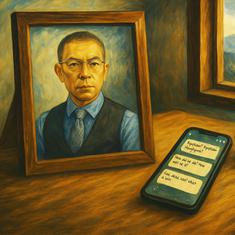Sharda looks at her pityingly, “Oh, madam, he hit you again, didn’t he?” Then adds after a pause, “Was it after dinner when he was, er. . .scolding you?”
“Yes,” Sanya says. “When we went upstairs to our room.”
“But why do you let him, madam?”
Sanya doesn’t reply. Sharda is looking at her expectantly waiting for an answer. When her gaze doesn’t drop, Sanya says helplessly, “You wouldn’t understand, Sharda. It’s not that easy.”
Sharda wants to add a rebuttal, but her eyes fall on the gas stove, and she hurriedly turns off the flame. Some tea boils over from the saucepan. She mops up the mess and pours the tea into two cups. The toaster behind her produces a loud ding and she extracts the bread slices and places them on a plate. She retrieves the butter from the refrigerator.
“Okay madam, you take the tea. I’ll lay out breakfast on the table shortly.” She looks up at the wall clock. “It’s not even seven. You’re up early today.”
Sanya yawns. “Yes, I couldn’t sleep well last night.”
Sharda nods slowly, obviously concerned, as she butters the toast. “Where is sir?”
“I’m not sure,” she replies, shaking her head. “Haven’t you seen him yet? He’s an early riser.”
“No,” Sharda replies. “I haven’t seen him since morning.”
“Okay, he might be in his study in the basement then,” Sanya says, “reading something.” She rolls her eyes. “He just reads all the time. Sometimes I think he’s a book with two legs sticking out.”
Sharda lets out a hearty laugh and Sanya chuckles, breaking the tension in the air.
“Okay, let me go and call him.”
“Sure, madam.” Then as an afterthought, she adds, “Don’t let him do this to you. Men become stronger when they know their women need them.”
Sanya takes the stairs down on the left of the kitchen and calls out her husband’s name. Once. Twice. It doesn’t take long for her to cover the entire length of the basement. At the far end, she pushes the door to her husband’s study.
She screams.
Hearing Sanya’s ear-splitting scream, Sharda comes sprinting down the stairs. Both women clap their hands over their mouth, and a sharp squeal escapes Sharda. They stare at the corpse of Sanya’s husband, Anant Kapoor. The body is spreadeagled on the floor beside the desk, in a pool of blood. There is a deep gash on the left side of the head. A blue vase, probably the murder weapon, lies a few inches away.
Sharda moves forward to pick it up.
“Don’t!” Sanya stops her. “It could – it could be. . .evid. . .evidence.”
Sanya is breathing heavily now. The hair on her arm stand on end. She feels a thin film of sweat at the back of her neck. She turns to Sharda.
“Call the police! Call the police!” she splutters.
“Oh my God! Oh my God!”
And then the tears come streaming down. With a choked sob, she bends over the corpse. She reaches out her right hand, wanting to touch him, but then holds back and clenches her hand into a fist. Sharda picks the telephone from the desk and dials 100.
A police jeep screeches to a halt outside 23, Golf Links. A tall, well-built man and a short woman with curly, black hair, both in police uniform, step out. The man has a strong jaw, neat, cropped hair and sinewy, athletic arms; his uniform fits him perfectly. He removes his sunglasses and slips them into his shirt pocket. Her pudgy frame makes the woman look shorter than she really is; she has sharp, piercing eyes and an air of self-assurance in her gait. They walk towards the bungalow, past the neatly manicured front lawn and past the yellow-and-black crime-scene tape pinned outside the door.
Inside the house, the atmosphere is dark and solemn. The curtains in the hall are still drawn and the air smells musty. Two police officers to their left in the living room are questioning a young man and a weeping woman who are seated on a giant beige leather sofa. They pause to glance around and, after a quick nod to their fellow officers, head past the dining hall and take the stairs down to the basement.
Downstairs, they turn left and head towards the room at the far end. The door is ajar, and they step into the study of the deceased man. The forensics team is quietly going about their job, clicking photographs of the dead body and collecting evidence.
“Hello. I am inspector Danish Maurya, crime branch, east zone, in charge of the case.” He nods towards his female colleague. “This is sub-inspector Kiran.”
A bald, middle-aged man steps forward, “I am Desai from forensics.” He looks over his shoulder at the dead body. “We’ll be sending the body for autopsy soon, but from the looks of it, it appears to be very straightforward. That blue copper vase,” he points to his colleague with the latex gloves, who is packing and marking it, “is the murder weapon and the victim was hit extremely hard just once. Death should have occurred in an instant due to major frontal impact.”
Maurya nods slowly. “Do you have an estimate of the time of death?”
“Yes,” Desai replies, “but very roughly. As per our preliminary forensic analysis it should be anywhere between 10 pm last night and 2 am this morning. But after the autopsy, as death has occurred very recently, we should be able to narrow down that to. . .say, less than two hours by examining the state of the digestion of food.”
“Good,” Maurya says appreciatively. “Please also let me know once you have the fingerprints off that vase.”
He steps towards the body and sits on his haunches. He studies the dead man. Late thirties or so, Maurya guesses.
“There wasn’t any struggle before he died,” he tells Desai, pointing at the dead man’s hands.
“Yes,” Desai agrees. “It was a pop, and he was out.”
Maurya looks down again. The gash on the left side of the corpse’s head is about an inch deep, exposing the skull. “Whoever hit him, hit him hard,” he says to Kiran who is now hunkering down beside him.
“Yes, I agree,” she says. “Must have hated him.”
“Well, let’s find out.”

Excerpted with permission from Bad Liars, Vikrant Khanna, Penguin.










